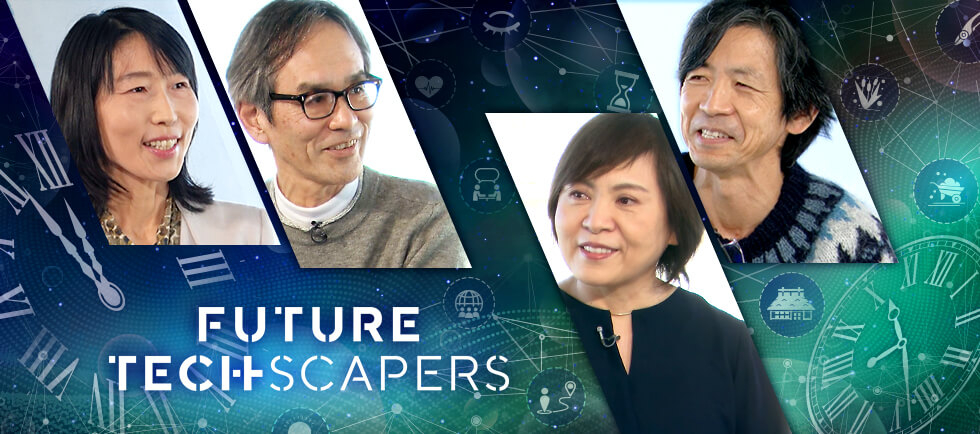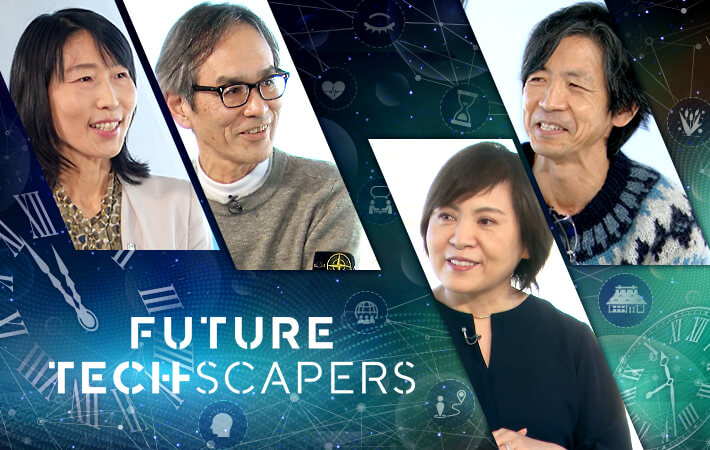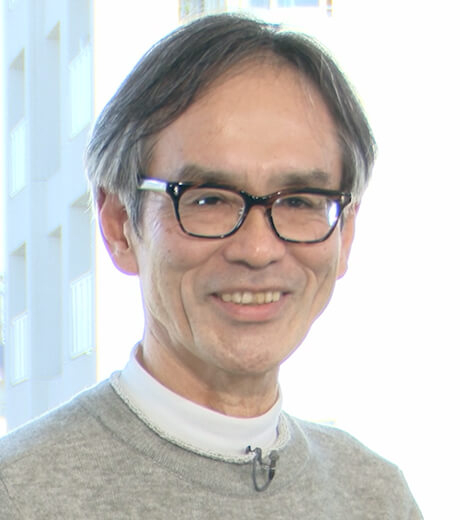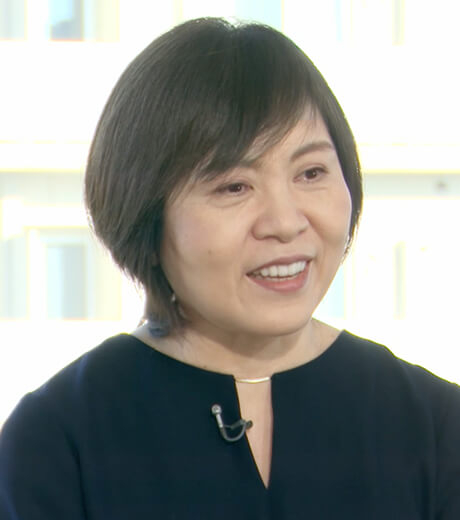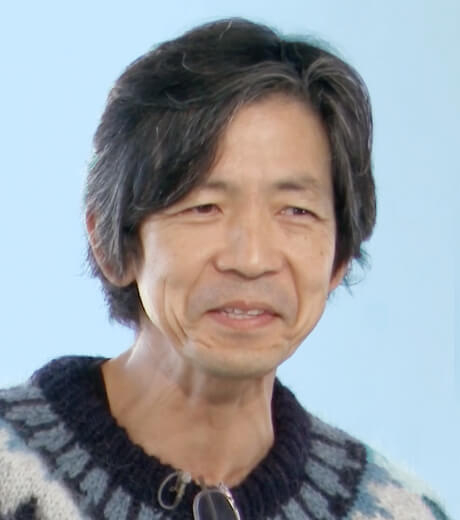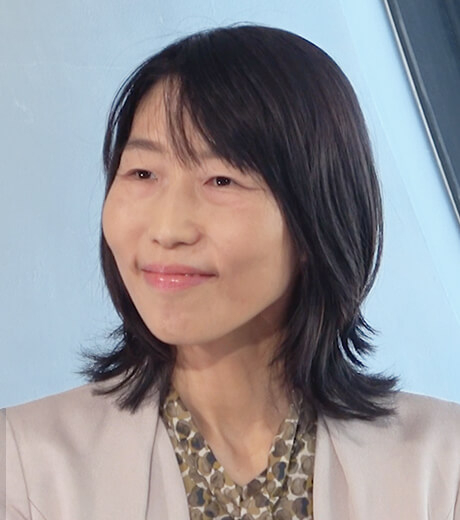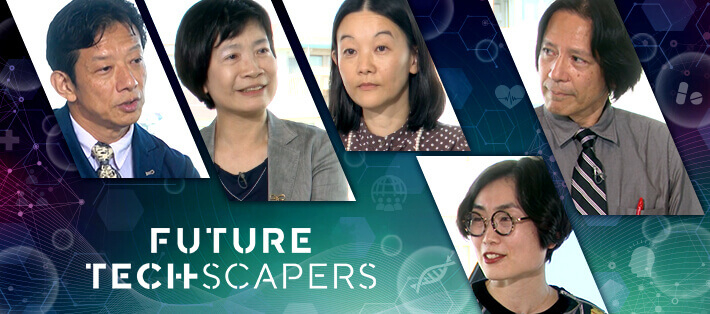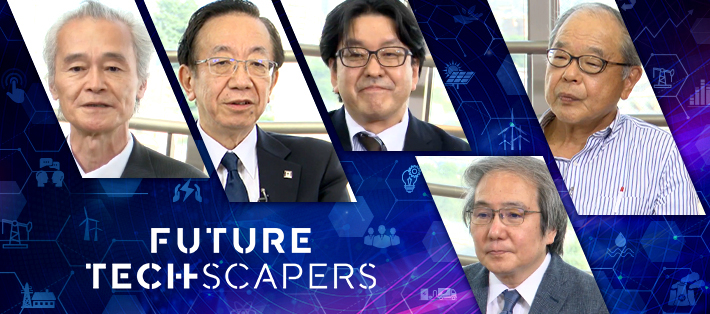DLab Dialog for the Future
Laboratory for Design of Social Innovation in Global Networks (DLab) has created 24 Future Scenarios to depict the ideal form of our future. In each installment of the video series project "DLab Dialog for the Future," cutting edge researchers and experts have selected one of the Future Scenarios to freely discuss topics such as how future advancements in science and technology can contribute to the realization of the scenario, and how the society, systems, and the people will change if the scenario is realized.
Toward a society where everyone can realize their full potential while helping each other
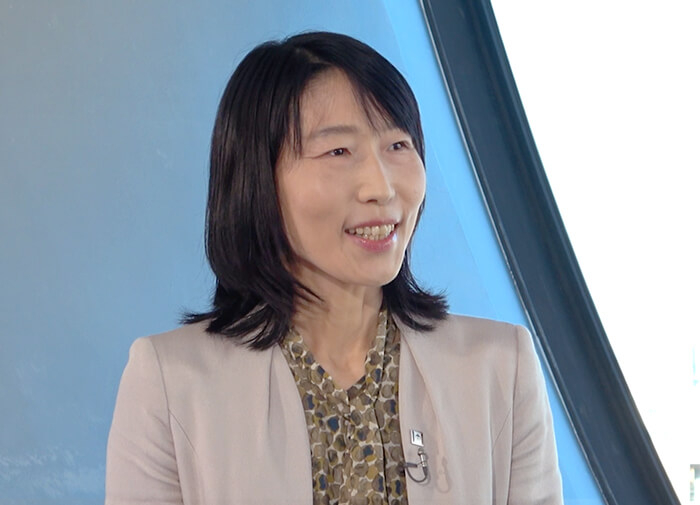
Komada: In this third series of the DLab Dialog for the Future, we wish to discuss the DLab Future Scenario No. 22. This scenario depicts a society in realizing global symbiosis or co-existence. We would like to discuss the following themes: "the future you want to create," "your ideal self image," and "how to respond when you are lost in life." Professor Nakano, would you begin by discussing the future you want to create?
Nakano: I would like to see a society where everyone can realize their full potential and support each other.
Human life in itself is a miracle when considering that the universe is said to be about 13.8 billion years old and the Earth about 4.6 billion years old. However, in Japan, people often refrain from doing what they want because they excessively worry about social conventions and what other people think. All people on Earth are living at the forefront of the history of the universe, so I believe that each and every one of us should live freely, thereby expressing piety to the universe and Earth which birthed us.
In his book The Power of Myth, Joseph Campbell called young people to "Follow your bliss." I do not interpret this advice as encouraging us to satisfy personal desires but rather calling to pursue things which bring endless fascination to our body, mind, and soul. It would be wonderful to realize a future in which everyone can find brilliance to their life, fully explore their potential, and help each other in this pursuit.
Focus on the present to create the future you desire
Komada: Director Shimura, would you please share your thoughts?
Shimura: I believe that the ability to feel and becoming more aware of what is happening at present is essential in creating the future. This is because looking too far into the future and losing sight of the present hinders your realization of the future.
Our minds can connect to our envisioned future only when we start creating our future now, at this present moment. We can obtain a better understanding of the future by seeing, thinking, and acting based on an examination of "what we are doing now" and "what the people around us are interested in and what they are doing." I believe the best way to achieve such understanding is to feel your presence here and now, because concentrating on your senses is connected to imagining in your mind the future you want, and then aiming to realize the future.
Komada: Your involvement in Dialogue in the Dark, guided by those with vision disabilities, is about enjoying the capacity of human senses other than vision and verbal communication in absolute darkness. Dialogue in the Dark is connected to the idea of concentrating on the present moment and now.
Shimura: In total darkness, it is difficult to simply walk or drink water unless you concentrate on every action your body makes. When given such limited conditions, we recognize the very essence of human behaviors such as drinking.
Komada: People tend to focus only on the future. Perhaps we need to pay a little more attention to ourselves and our environment we are situated in at the moment and at the present time.
Create a future that brings along the past
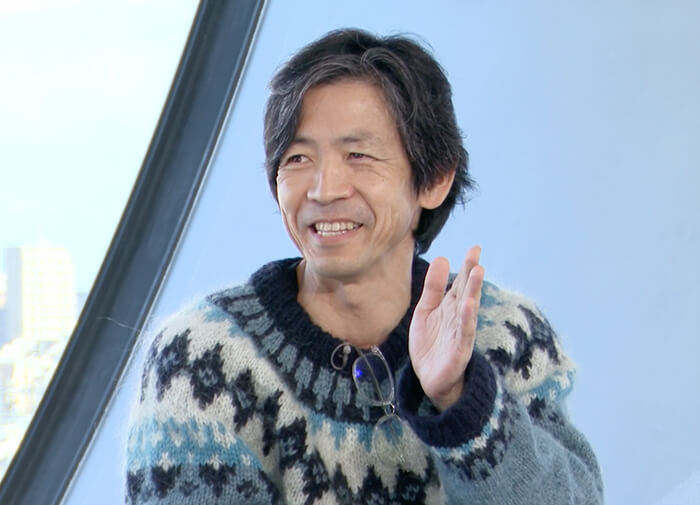
Komada: Professor Tsukamoto, what are your thoughts?
Tsukamoto: Over the course of my research on architecture and cities, I became interested in things that have existed in a certain place for a long period of time. Perhaps this is why I want to create a future that brings along the past in a beneficial manner. In fact, the existence of human beings is significantly based on the society's cultural past to which they belong. I am averse to a future in which the past is denied.
Since 2019, I have been working on a project to restore satoyama (traditional Japanese rural landscape located between cities and deep mountains) in Kamogawa City, Chiba Prefecture. The lifestyle of the people in satoyama have maintained its surrounding natural environment to secure food, materials, and energy needed in their lives. The traditional houses are built with clay walls made from rice paddy soil mixed with straw, and thatched roofs covered with plants such as Japanese silver grass. Unlike cities, where agriculture, forestry, and construction are carried out as individual industries, the activities of agriculture, forestry, and architecture are integrated in satoyama, and materials used are seamlessly moving back and forth.
Take rethatching of the roofs for example, the necessary amount of thatch grows just at the right time, and communal laborers in the village are able to rotate the work needed. After the roof is rethatched, the removed thatch spreads over the farmland as fertilizer. This is a wonderfully well-balanced mechanism that truly excels as renewable architecture; creating ecological loop of regenerative ability of living things, the ideal form of architecture, and how to create social organizations.
However, the law stipulates that noncombustible materials must be used for roofs in urban areas. Consequently, even if you wanted to construct a new building with a thatched roof, it would be difficult to implement. Engaging in the activities of Satoyama has made me realize the pitfalls of conventional social systems. We need a future in which people can enjoy the autonomous system of its surrounding environment, by freely accessing its natural resources. In particular, it would be beneficial for a country like Japan, which is rich in land resources, to take the lead in realizing such a future and showcasing its method to the world.
Nakano: In places like Satoyama, people have lived interdependently with nature even before the word "ecology" was invented, and ecological wisdom was acquired over time such as how to replace thatched roofs. We must reconstruct such wisdom while analyzing from a current perspective.
Acquire in the first half of life and let go in the second half
Komada: Next, I would like to ask about "your ideal self image;" in other words, how do you want to live as an individual?
Nakano: I believe that the first half and second half of life have different images. The first half is the time for diverse exploration, acquisition of many things, and establishment of yourself. The second half is the time to let go of what you have gained and become as an "empty existence" as much as possible.
One image rooted in our Eastern societal thought is for a person to "become a hollow bamboo and play the notes of the universe." A flute is a hollow musical instrument. It cannot be played if something is stuck inside. Now that I am 65 years old, it would be wonderful if I were able to follow this image and let go of various things, empty myself, and play the music of the universe by letting the universe flow through my empty vessel.
Before I started a career at a university, I worked for an advertising company for 30 years. When I began singing, I looked back on my busy years and realized that there are three important points that make everyday life beautiful and mindfulness, and this is the motif that inspired this song.
Komada: We would like to listen to the song.
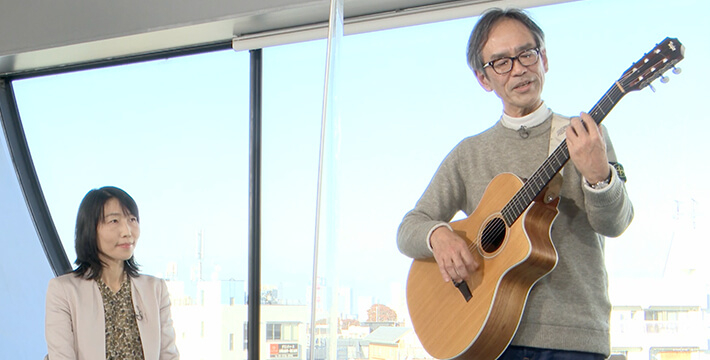
Sung while playing guitar: Hints for beautiful living
Nakano: The three important points are "don't compare," "don't strain," and "be elegant and attentive." These points are also the lyrics of the refrain. "Don't strain" does not mean pushing yourself to try hard. Instead, it means that rather than forcing yourself to work hard on externally designated matters, you should find something you can be passionate about from within.
Being considerate and get actively involved
Komada: Director Shimura, would you please discuss your thoughts?
Shimura: As an example, I would like to discuss an episode I encountered while on a train. When I was raising my children, there was more face-to-face, humane communication on trains than now. When I became upset because my children would not stop crying, a few people would give up their seat and try to make me feel better by mentioning how their child behaved the same way.
People who happened to be riding the same train as me tried to help in various ways, so even though I raised my child with almost no help from my partner, I never felt lonely. I have always wanted to be that kind of a helpful person, and I would like to increase the number of such circle of people.
I feel that being in such a circle is truly magical. The train on which I commute is extremely crowded and difficult to get on. However, when I politely ask the passengers, they are willing to open up space so that a few more people can get on. When I say thank you, there are people who will say that we all have to help each other. Meeting with those who share the same value on human interactions creates an indescribably wonderful atmosphere.
Nowadays, there are many people who are quiet even on trains. Nevertheless, now that I have reached a certain age, I have no problem becoming a meddlesome old woman. I feel that I should be able to help others while being meddlesome in a beneficial way.
Komada: That is intriguing. It seems that such behavior will create a positive recursive cycle in realizing your ideal self-image.
Shimura: I certainly hope so!
Becoming "resourceful human" who can independently acquire what he needs
Tsukamoto: A few years ago, I flipped the phrase "human resources" to come up with the concept of a "resourceful human." Since then, I have been wanting to get as close to that concept as possible.
The phrase "human resources" is said to have first appeared in Japan under the national unification system prior to World War II. Essentially, it is a concept of viewing people from a manager's point of view, although the nuance has faded in the current era. I also witnessed numerous students whom I found very interesting try to fit themselves into the mold of "human resources" for job hunting purpose. This never felt quite right to me.
The fundamental reason why students have no choice but to fit into the mold is because we depend on external services for life sustenance, such as energy and food. On the other hand, for example, a fisherman who I met is a "resourceful person", and have the capacity to directly access and acquire necessary sustenance. Accordingly, there is no need for him to fit the mold of human resources.
With that thought in mind, I also began to experiment with the utilization of various resources around me; for example, sunlight and edible plants. In particular, the satoyama are rich in natural resources. When living in satoyama, the more effort exerted, the more that can be acquired. Through such efforts, skill of using tools is also acquired.
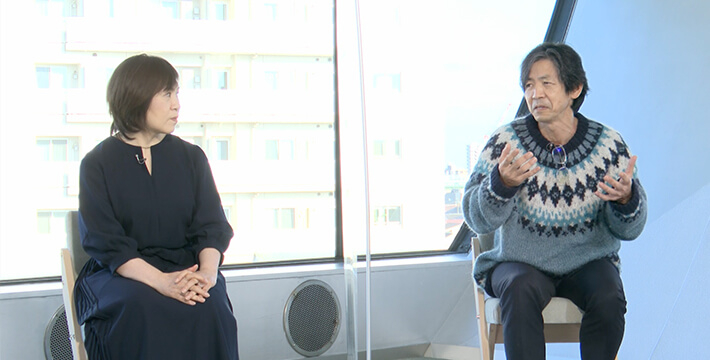
Nakano: True; when living in the countryside, you are certain to find barns with various tools inside. People who live in nature have to do many things on their own. Since there are abundant resources, those people can live without being so dependent on the economy.
Tsukamoto: On the other hand, cities are full of facilities that provide services, but city dwellers rarely use tools. This accurately reflects the difference between rural and urban life, as well as the difference in the human image of residents of the respective areas. In the future, I hope that cities are built in a way that encourages humans to use tools more often.
Recently, in Europe, the Right to Repair has been established and the new movement of "tool shed architecture" has emerged. Exemplifying this movement is the Museum learning program that work and create together with artists; in other words, tool shed-type museums. I think Tokyo Tech was originally a tool shed-type university, but it now seems to be trending toward an emphasis on theory instead of tool shed-type action. Therefore, I would once again like to see Tokyo Tech as a leading creator for tool shed oriented era.
It will be important to feed the knowledge and wisdom gained in satoyamaback to the city. I believe that lowering the barriers between cities and farming villages and moving back and forth between the two could create an environment for practicing post-capitalism, and in forming a renewed image of life.
Nakano: I am also based in Yakushima Island. Young parents who have moved to the island for child-rearing are engaged in various activities such as farming, mountain guides, and video streaming. The families live in homes constructed by methods that regenerate the earth. I am impressed to see that people are pursuing a way of life that will improve the environment rather than putting a burden.
'Getting lost in life' will lead to positive outcomes
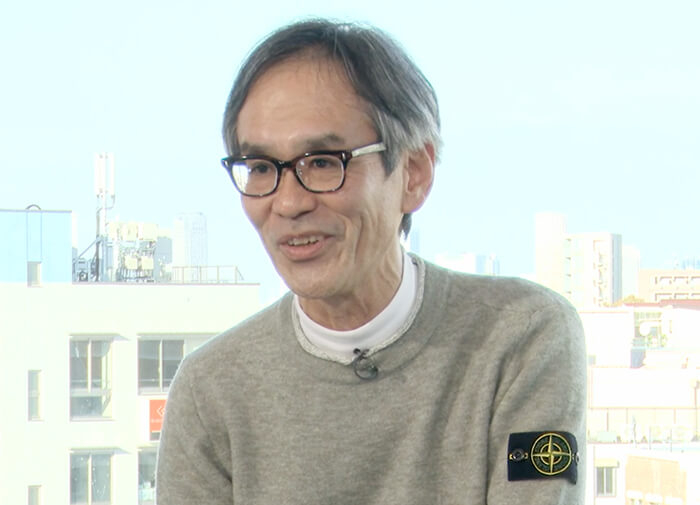
Komada: As a takeaway message to the younger generation, please share your thoughts on what to do when feeling troubled in life.
Nakano: Paradoxical it may sound, I think it is important to take time to look into your doubts and worries. I had a lot when I first entered university as a freshmen, and I took a break in the summer and went on a trip to reconsider my path in life. As a result, I learned many great things while traveling.
People grow through trials. Conversely, they do not grow very much when things are moving smoothly or according to prior plans. It is important how well you confront difficulties and trouble, and how well you overcome trials in life. If you are able to do so, you will someday reflect back and realize that those difficulties and trials made you the person you are today. Therefore, when experiencing doubt and trouble, it is better to take the time to feel, rather than searching for an easy solution.
It is also important to embrace any challenge and not to fear on failures. No one enjoys failure. However, if you strive to learn from failure, the experience of failing will become sustenance for your next step. When you have this mindset, there is no such thing as failure. Many people these days do not take the first step due to fear of failure. There is nothing to fear from if you try and learn from the experience when you dramatically fail.
Become a "Straw Millionaire"; Accumulating incremental successes
Tsukamoto: I would like to discuss a method that ultimately results in success through embracing one's doubtful thoughts. It is a method by taking small steps and moving forward little by little. In a Japanese traditional tale Straw Millionaire, a poor man becomes wealthy through series of successive trades, starting with a single piece of straw. Keeping this image in mind, I think it is good to advance upward through incremental success.
If people initially set a goal which is too big, they tend to despair and give up when things do not develop according to their plan. Instead, it is better to raise your target values little by little while accumulating small successes. Personally, I have continued my activities based on the belief that continuing what I am doing now will ultimately lead to a better future as a whole.
Nakano: As a result, you have published an enormous amount of works and books.
Tsukamoto: I always work on several activities at once. That way, even if I question myself while working on one activity, I can proceed with another. When the time comes, I am often struck with a good idea about something that I had been questioning for a while. So I think working on several different activities at once is a good way to overcoming doubts and concerns.
The importance of reflection
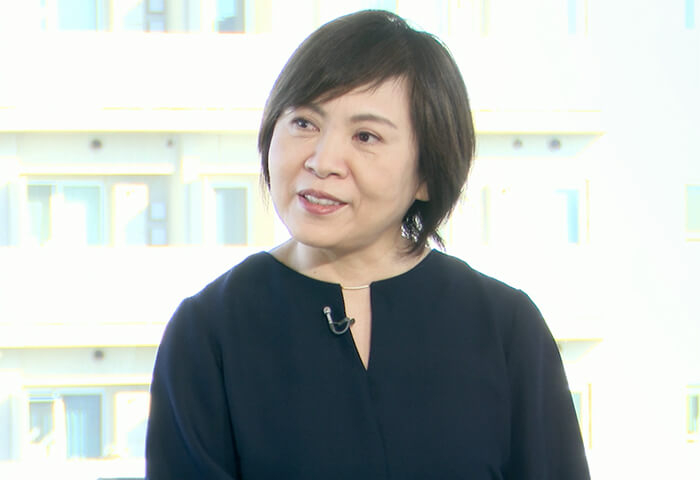
Komada: Director Shimura, would you please discuss your thoughts?
Shimura: This is a difficult because I often question and doubt myself when encountering problems in life. I remember when I was climbing a mountain and a friend told me the following: "If you get lost, do not keep going. Instead, stop or go back. By doing so, you can find the right trail." I felt that my friend's advice was very valuable.
The Dialogue in the Dark activities in which I am involved are conducted in about 50 countries around the world. In most of these countries, the Dialogue is held with financial assistance from the government. In fact, there are almost no cases in which the Dialogue is held by private organizations, except in the case in Japan. This lack of government support made it very difficult, and I thought of quitting many times. However, when I think about why I decided to start Dialogue in the Dark, I remember how I thought the activities were truly important when I first embarked on this path. In this way, going back to the starting point and engaging in self-reflection makes it easier to find a way to deal with doubts and concerns.
If you still can not find a good path yourself, it may be a good idea to ask people around for help. Personally, I turn to myself for help as I try to do my best on my own at first. However, when I am in trouble, it is important to ask people I trust for their wisdom on what I should do.
Tsukamoto: I agree. It is important to return to the beginning. For example, I feel that people living in Japan in this modern era share similar concerns in life. There are interesting lessons to learn from by reflecting back on history to consider what original conditions were like and where the current situation came from.
Komada: In current times, unexpected things are happening one after another. It may be a good time to look back on the past and history, with the hope that such reflection will lead us to creating the future. Professor Nakano, how do you feel about this?
Nakano: Listening to Director Shimura reminded me of the importance of remembering my original intentions. After you repeat doing something for a long time, it is easy to forget how you felt when you first started. However, remembering the excitement which you felt at the beginning can be reinvigorating.
Earlier in our discussion, I referred to Joseph Campbell's advice to "follow your bliss," and to follow your heart. I wrote a song which expresses this wish. I would like to play the song as a final message in today's dialog.
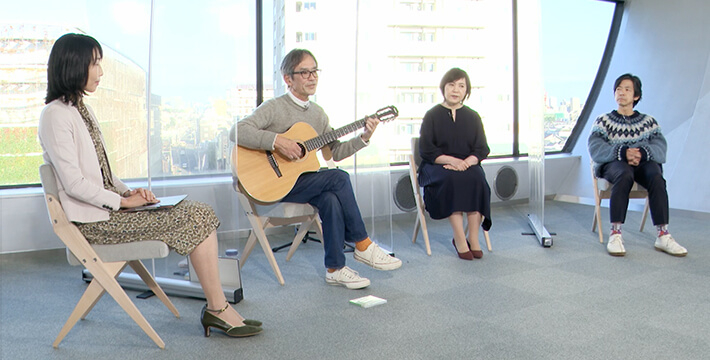
Sung while playing guitar: Follow Your Bliss
Komada: Thank you, Professor Nakano. The three unique panelists who participated today enlightened us with memorable talks on how to navigate yourself when you get lost in life. At Tokyo Tech, we will continue to examine the past, present, and future together with all members of society, together with faculties from liberal arts and other fields of academia. DLab will continue to play a leading role in these activities. I would like to thank all of our panelists for participating in today's dialog.

DLab Future Techscapers
A video series including "DLab dialog for the future." Researchers discuss their research based on future scenarios. "Techscapers" is a word combined with "Technology" and "Landscape." This series features people with a broad view of technology and society.
The Special Topics component of the Tokyo Tech Website shines a spotlight on recent developments in research and education, achievements of its community members, and special events and news from the Institute.
Past features can be viewed in the Special Topics Gallery.
. Any information published on this site will be valid in relation to Science Tokyo.


